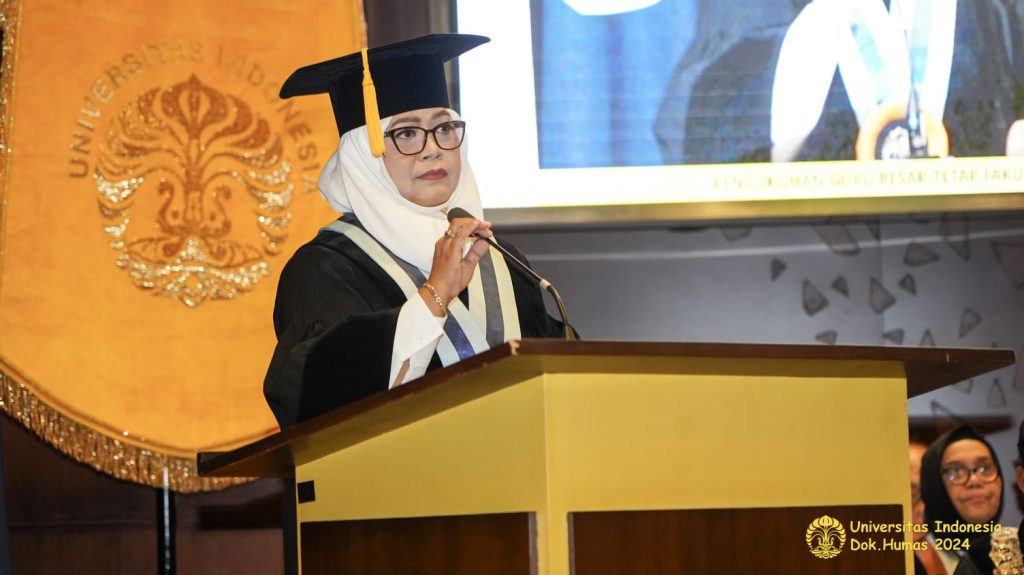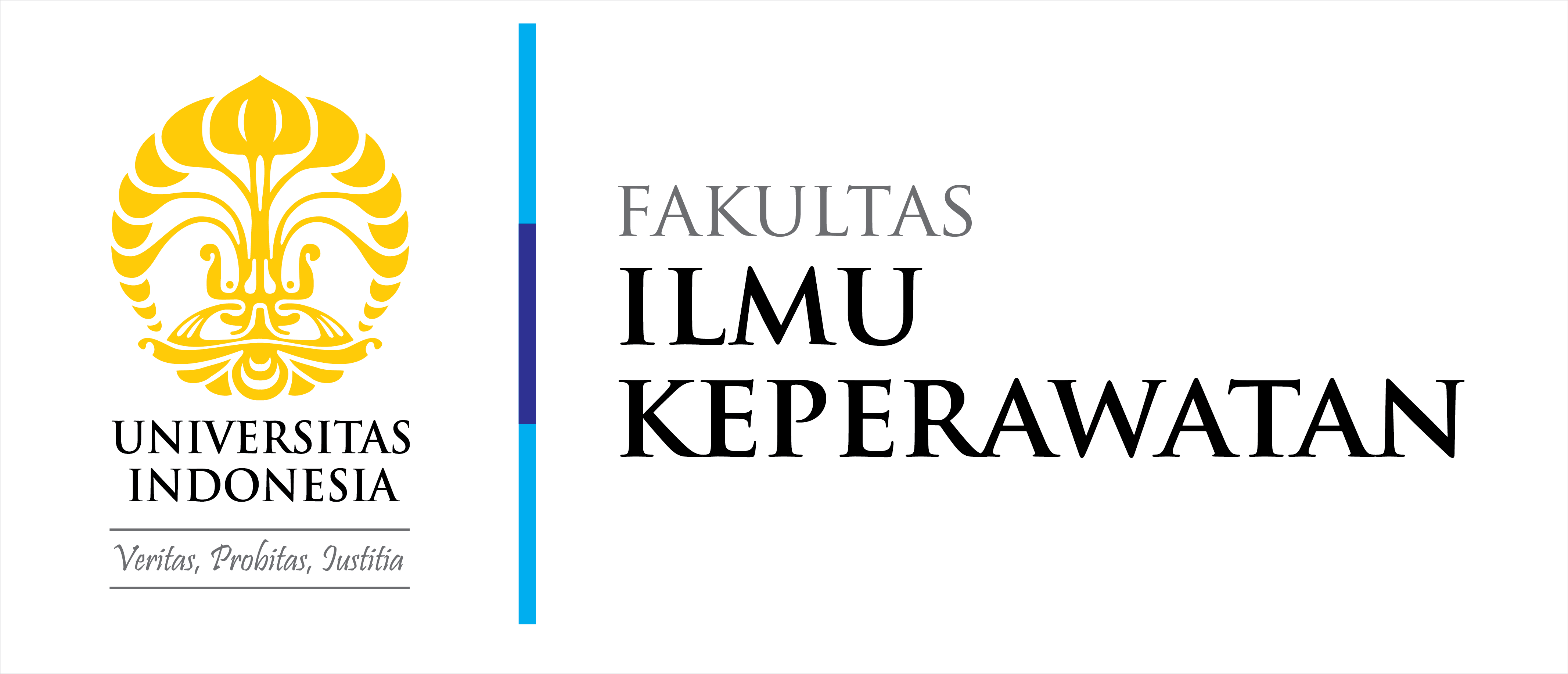
Depok, 18 December 2024 - The University of Indonesia (UI) inaugurated Prof. Dr. Nani Nurhaeni, S.Kp., M.N as a permanent professor in the field of paediatric nursing, Faculty of Nursing (FoN) at Balai Sidang, UI Depok Campus, on Wednesday (18/12). At the inauguration led by UI Rector Prof. Dr. Ir. Heri Hermansyah, S.T., M.Eng., IPU, Prof. Nani delivered her inaugural speech titled ‘Holistic Nursing Approach Focused on Family-Centred Care to Improve Children's Health Status’ and became UI's 45th professor to be inaugurated in 2024.
Starting her speech, Prof Nani explained the current condition of Indonesia's child health problems. Some of the problems identified are first, nutritional problems, especially malnutrition and stunting, are still high, with around 24% of children under five experiencing stunting. Second, the problem of infectious diseases, namely diarrhea, pneumonia, and tuberculosis is still the cause of child mortality (WHO, 2022). Third is the mental problems of children including adolescents that need important attention.
He further said that every child has the right to live healthy and develop optimally. Healthy children are also an asset for future generations of the nation. As one of the health professionals, paediatric nurses need to contribute to child health promotion efforts so that children are maintained and protected from various health problems. For this reason, she said that health promotion focuses more on disease prevention and improving overall health status. Proper health education can help children and families understand the importance of a healthy lifestyle, including good nutrition, physical activity, and personal hygiene. ‘It is important to implement family-centred care (FCC) strategies to support children's optimal growth and development. This approach emphasizes the active role of the family in the care and nurturing process, so that children can grow up in an environment that supports their health and strengthens the parent-child emotional bond,’ said Prof. Nani.
She added that good parenting not only impacts the well-being of children today, but is also a great investment for Indonesia's human resources in the future. ‘By supporting holistic child development, we are contributing to the formation of a healthy, smart, and ready to face the challenges of the future,’ said Prof Nani.
Family empowerment at the core of the FCC approach emphasizes the importance of family involvement in children's health care. Families can play an active role in the care, treatment and decision-making related to children's health, which in turn can improve children's best health outcomes. Family empowerment is not only considered as a subject that has an important role in the process of child health development, but also includes how to create families that are prosperous, independent, and able to face the challenges that exist in the family environment.
In addition, Prof Nani said that one of the main focuses in child health promotion is nutrition, especially in the context of the first 1000 days of life. This period starts from conception until the child is two years old and is a critical phase for child growth and development. Good nutrition during this period is essential to prevent stunting, a condition of failure to thrive caused by chronic malnutrition. Meanwhile, health promotion and preventive measures in hospital service settings can be carried out while still prioritizing and promoting curative and rehabilitative services, as stipulated in UU No. 17 Tahun 2023 Pasal 1 Ayat 3. In this context, health promotion and prevention of disease and treatment complications can be implemented through various actions that are integrated in health services.
Family involvement and empowerment in child care is applied through the FCC approach. By empowering the family in planning and assisting during the care process, as well as providing clear information about the child's condition through therapeutic communication, care goals can be optimally achieved. This approach not only improves the quality of care, but also ensures that family satisfaction is realized, as they feel more involved and cared for in their child's care process. Thus, the integration of health promotion and family engagement is key in improving hospital outcomes.
‘Let us together commit to improving the health of children in Indonesia, so that they can grow and develop well, becoming a healthy and productive generation. The role of health workers including pediatric nurses needs to be activated to fulfill the Health Pillar Transformation, so that morbidity and mortality rates of children can decrease,’ said Prof. Nani.
She also said that pediatric nurses' roles are not only limited to providing nursing care, but can include prevention and sustainable health promotion. Family empowerment can be used as a holistic approach in implementing the FCC concept. Through this approach, pediatric nurses can ensure that interventions can significantly contribute to creating a favorable environment for children's health, preventing future health problems and improving long-term well-being for future generations.
Before being inaugurated as a professor, Prof Nani underwent her undergraduate education at FoN UI and graduated in 1992. Then, she completed a master's program at MUNSON Canada in 2001. Then, she returned to FoN and managed to get a Doctorate of Nursing Science in 2014. Also present at her inauguration were Chairperson of the Indonesian National Nurses Association (PPNI) Dr Harif Fadhillah, S.Kp., S.H., M.Kep., M.H.; President Director of the University of Indonesia Hospital (RSUI) Dr dr Astuti Giantini, Sp. PK (K), MPH; and Director of Supervision, Audit, and Inter-Agency Relations of BPJS Health Dr Mundiharno, M.Si.

Gedung A Lantai 2, Rumpun Ilmu Kesehatan (RIK), Kampus UI Depok,
Jl. Prof. Dr. Bahder Djohan, Kampus UI Depok, Pondok Cina, Kecamatan Beji, Kota Depok, Jawa Barat 16424, Indonesia.
Jl. Prof. DR. Sudjono D. Pusponegoro, Kampus UI Depok, Pondok Cina, Kecamatan Beji, Kota Depok,
Jawa Barat 16424, Indonesia.